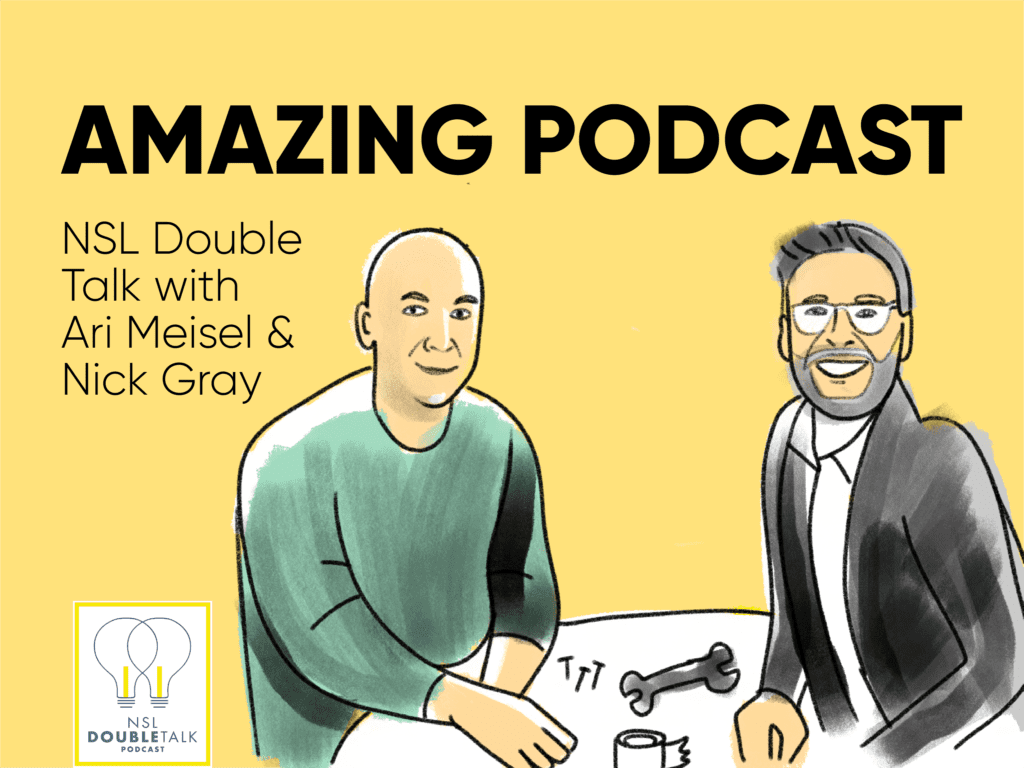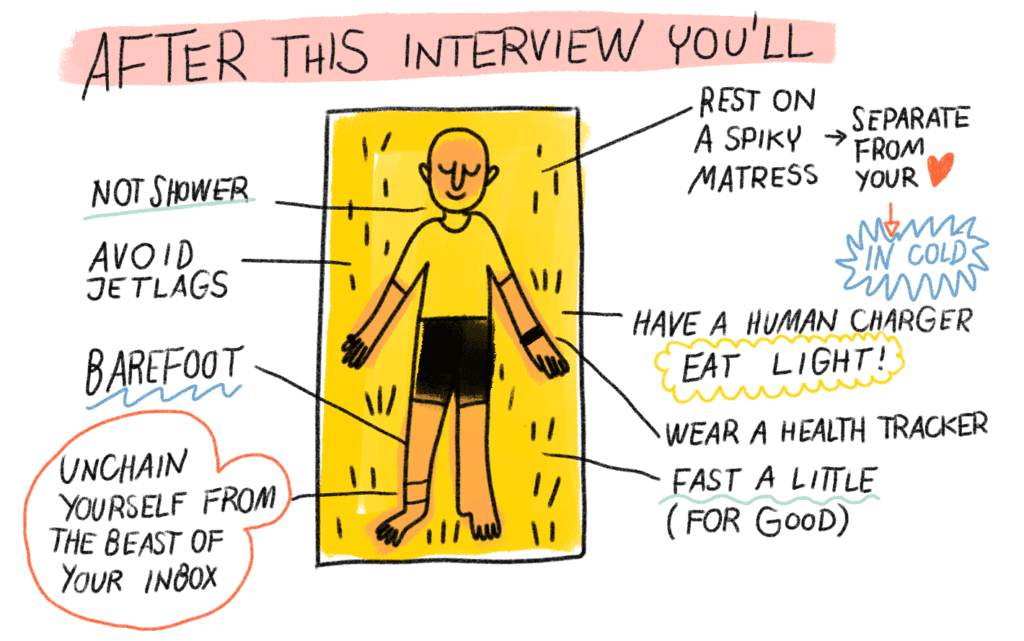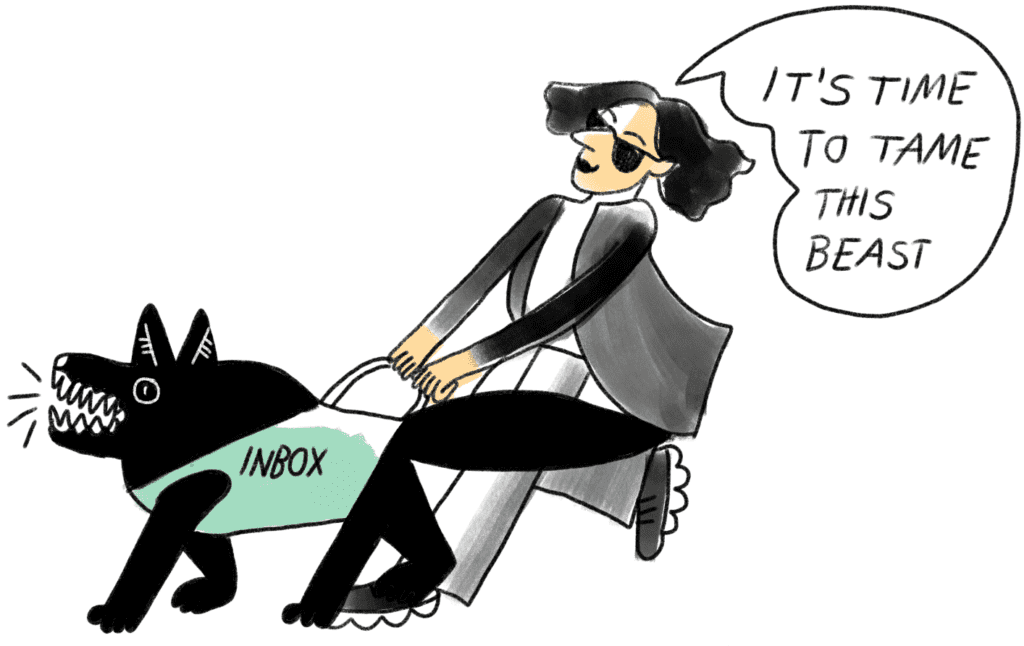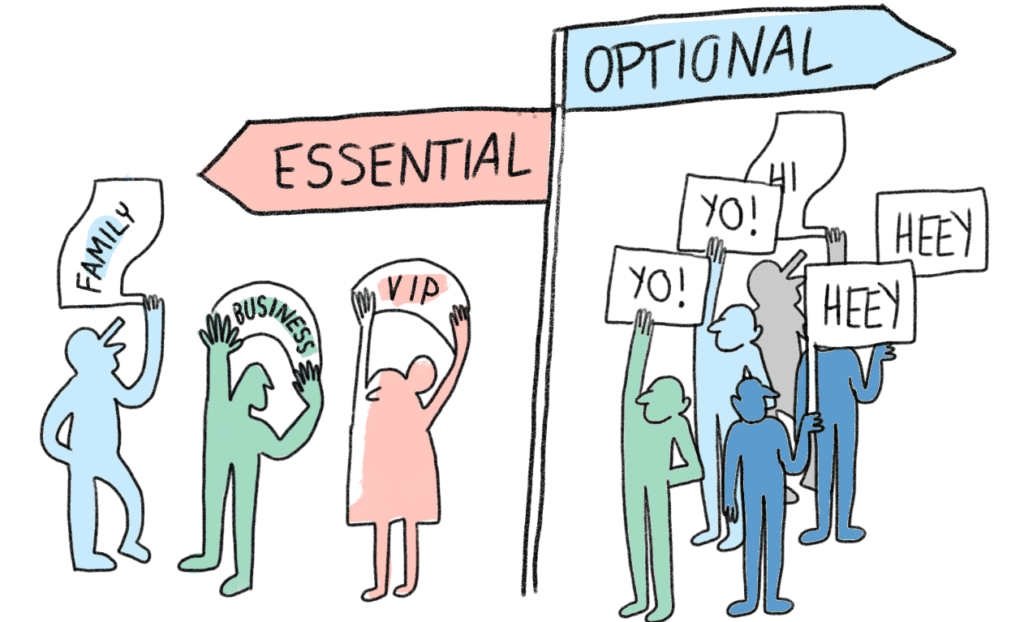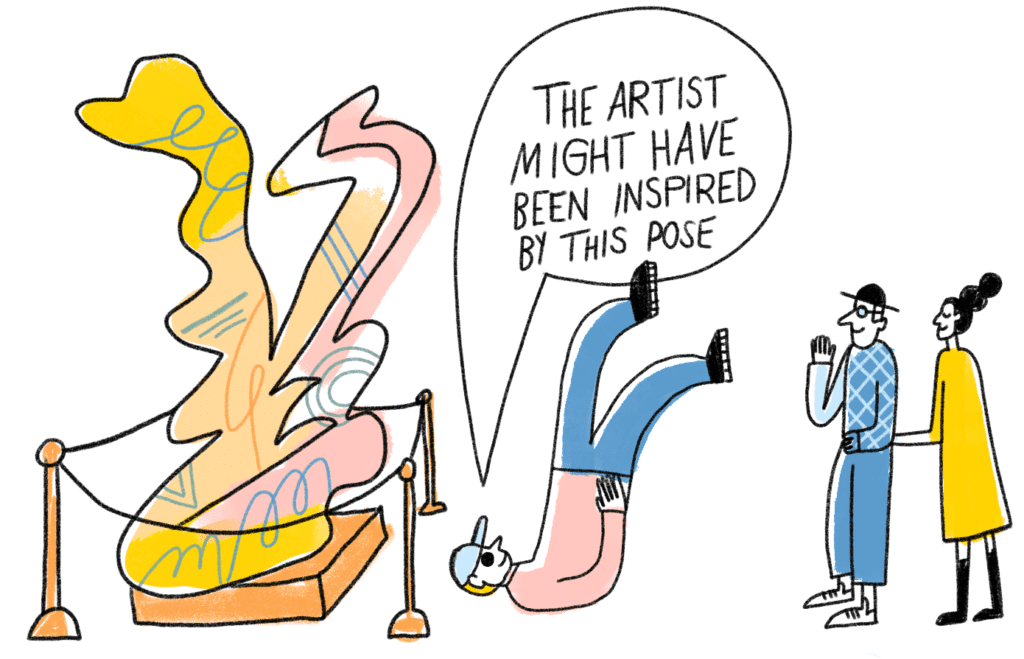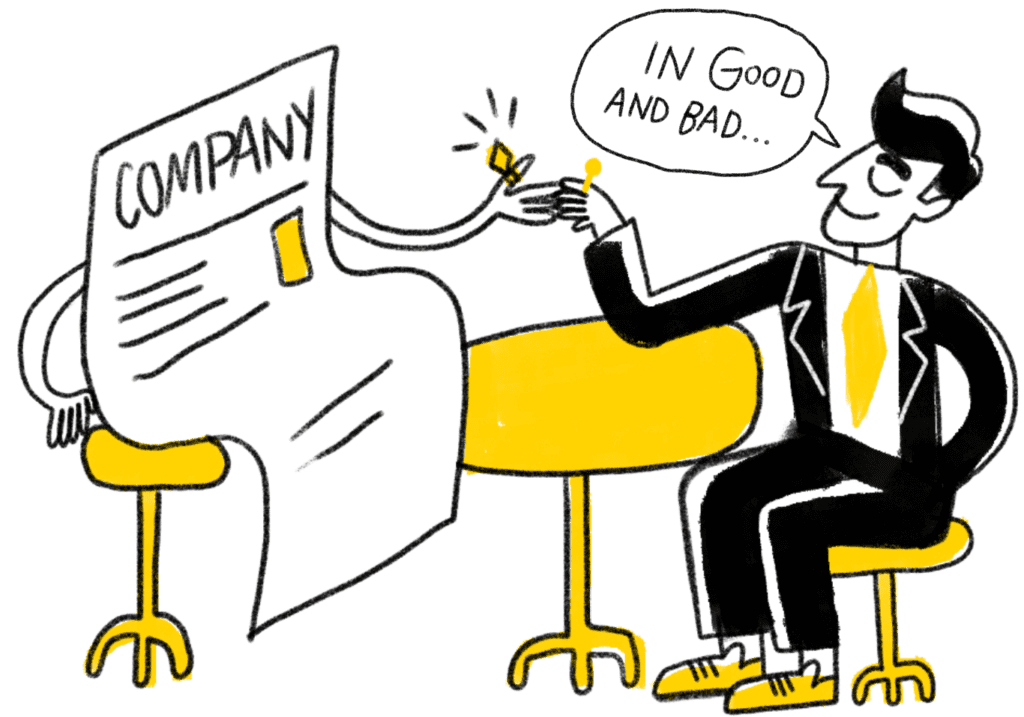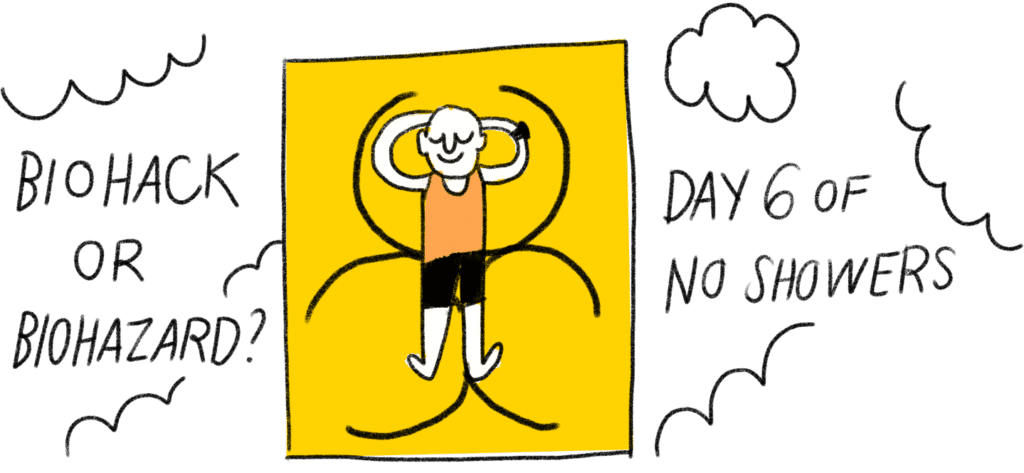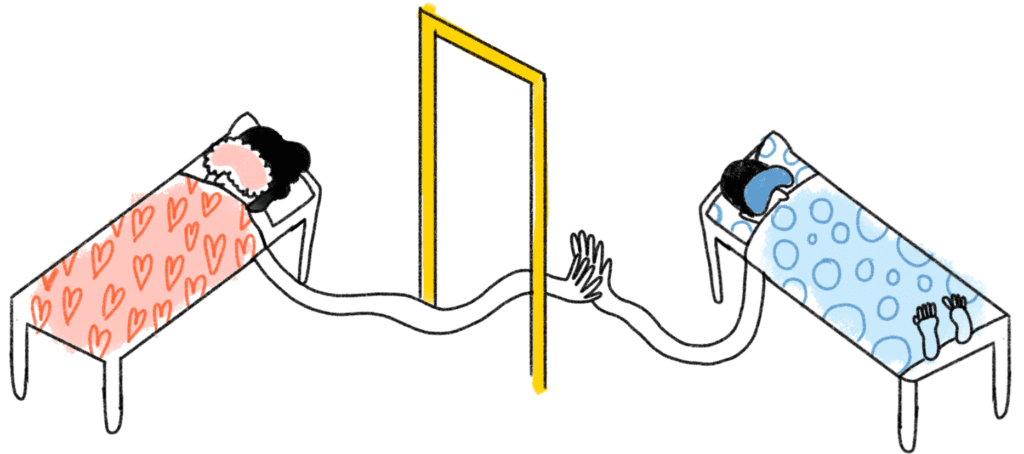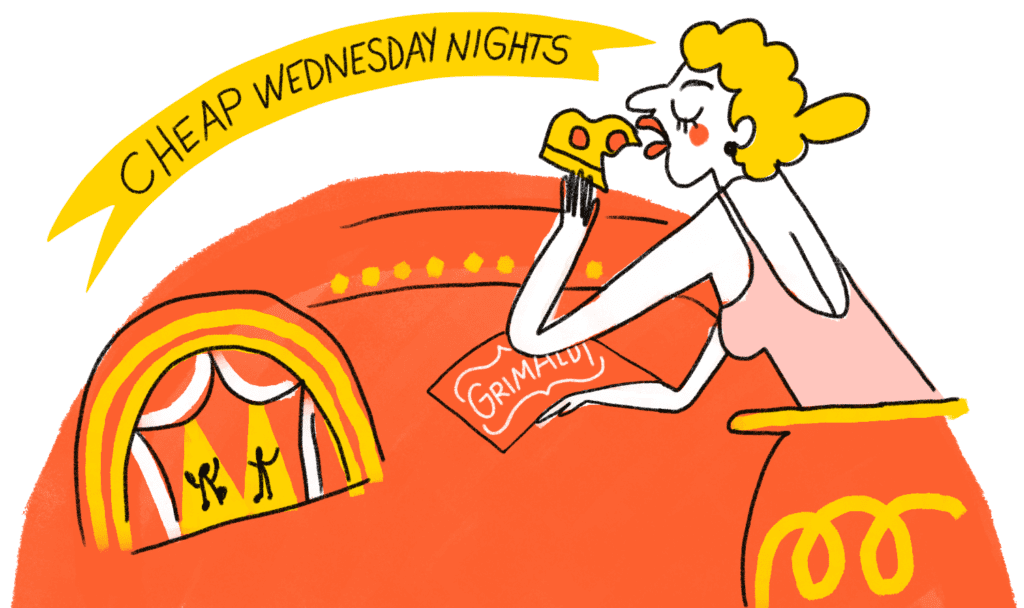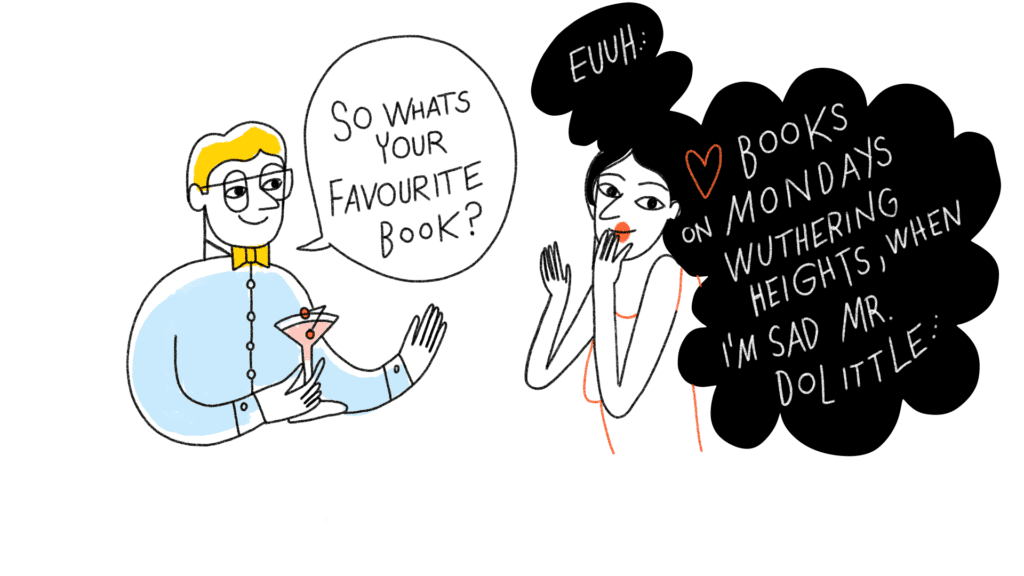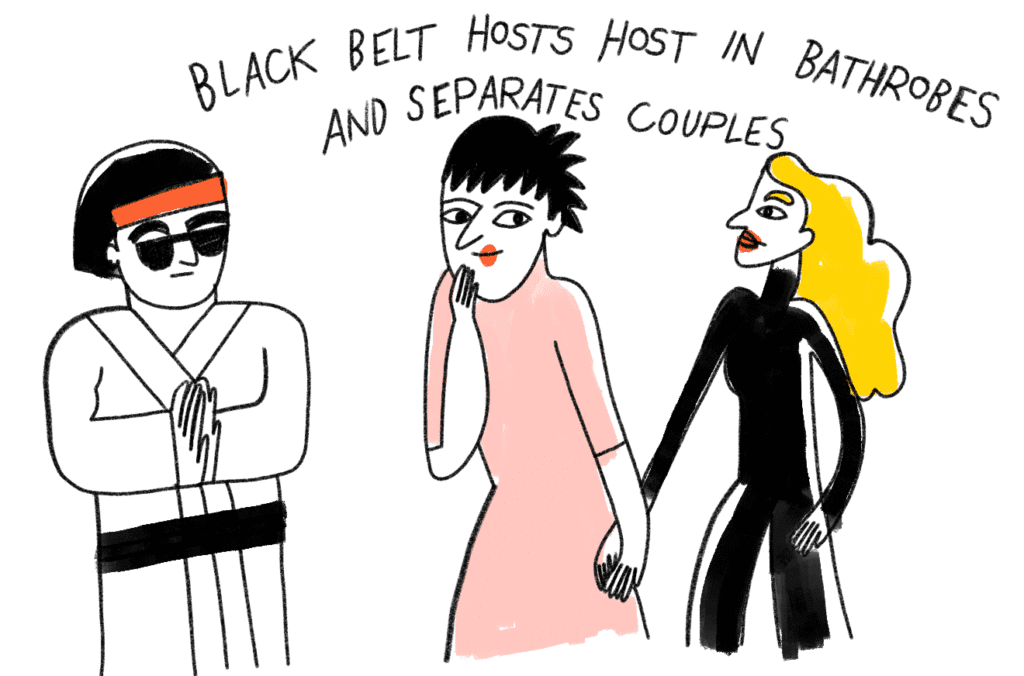Last updated: October 14, 2023
Last year I sat down in a fancy Manhattan skyscraper with my very good friend Ari Meisel.
Ari is known for his company Less Doing. He helps entrepreneurs to optimize, automate, and outsource everything so they can scale their business.
We recorded a podcast together for NSL Double Talk. Listen to it here: on Apple Podcasts, or on Spotify.
I think it was my favorite podcast I’ve ever done!
Ari and I talk about a bunch of things we’re both interested in, like sleep and gadgets and tech, and the tools we use to be more productive.
Listen to the Podcast
- Apple Podcasts: Nick Gray and Ari Meisel on NSL Double Talk
- Spotify: Nick Gray and Ari Meisel on NSL Double Talk
Read the Transcript
Ari Meisel: Hey Nick!
Nick Gray: What’s up Ari! How’s it going?
Ari Meisel: Good. It’s always good to see you.
Nick Gray: Thank you! I love to talk to you. The thing I like about speaking with you is that I always come away with something new. Some new ideas that can improve my life.
Ari Meisel: Really? I feel the same way. You know I was trying to think. How long have we known each other?
Nick Gray: I first heard about you from one of your personal productivity and optimization courses that I think you were teaching, gosh, seven years ago.
Ari Meisel: That would have been like nine years ago actually.
Nick Gray: Yes.
Ari Meisel: Did you come to one?
Nick Gray: I came to them. I was in the audience.
Ari Meisel: That’s funny.
Nick Gray: I learned so many things that day by the way. I came away with a laundry list of new things to improve my life.
Ari Meisel: Anything that stuck with you today?
The Zero Inbox Principle
Nick Gray: You’ve always been particularly passionate about inbox zero, filter, sort, get rid of your inbox. Don’t manage your calendar tasks in the inbox and so that is something that absolutely still sticks.
Ari Meisel: Yeah, it’s a funny one that people often try to do that, use email as a tool that it is not intended for. It’s a communication tool. It’s not a project management tool. It’s not a to-do list. And actually if it is a to-do list then it is a to-do list that other people fill for you.
Nick Gray: Um hm.
Ari Meisel: Which is a pretty bad thing.
Nick Gray: Oh my gosh, my girlfriend has an inbox of 13 thousand emails and the greatest gift she gave me over the holidays was she said ,” Can you help me with my emails?” And I was like YES! Thank you. I have been dying to clean this out. And there’s that one script that you have that you can search for all of the messages that include the words unsubscribe and things like that and it just cleaned out thousands of emails for her. It was just a big load.
Ari Meisel: Typically when we see people use the word “unsubscribe” it’s like 63% of their emails. I find that is an interesting sort of simile for something larger in life which is being the essential and being the optional. Right? And we need to be able to focus on what’s essential and the optional is there for when we want it, but it’s not something that’s in our face because we have too many things that are sort of barraging us online and if you are barraged with the essential and the optional at the same time, that’s when people start feeling overwhelmed.
Ari Meisel: So, I actually want to talk about your background a little bit. You have tons and tons of friends, you throw great events all the time, you’re always learning new things,and you’re involved in all sorts of different things. So how did you go from selling the company to that?
Nick Gray: Well born into the lap of luxury, just kidding! I was born into a middle class family, I grew up in the suburbs, my dad was always this mad scientist type guy and was inventing new things and he made this one thing that was for small jets that was showing them how to fly across the world. He just had this idea and was working on it in the basement and after I graduated from school I figured I’d help him out for a few weeks and it was a great idea. I got to do things that really helped him and we grew that into a larger sort of business. We started to hire people. It grew to, I believe, 75 people or so and it made that map where it shows you where the plane flies across the world and it was small jets.
Museum Hack
Nick Gray: We sold that and then I moved to New York for the people. I moved here because I’m so excited and inspired by people and I wanted to be surrounded by great people. But when I moved here I had no idea how to meet people. I didn’t have a network. I didn’t even know if I needed a network and I guess the one thing I found that changed everything for me was when I started to host events, specifically cocktail parties. I’d try everything though. I’d go meet people. I’d go to meetups. I’d go to all these different things, but I started to host events and then those events kind of turned into my museum tour business that was really fun.
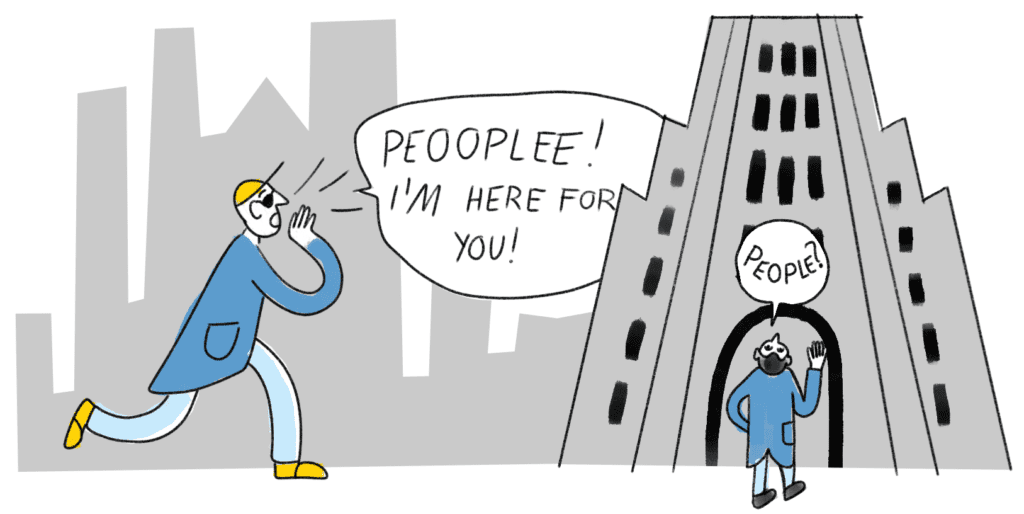
Ari Meisel: So what’s the connection there because Museum Hack is an amazing company that you’ve created and I’ve gone on the tours myself and they’re awesome but how did you go from trying to network and make friends to that?
Nick Gray: Museum Hack, by the way, is a business I started that does renegade museum tours at some of the best museums in the world. Mostly in America, New York, L.A., San Francisco. And what’s special, it’s a two hour museum tour, but what’s special is we hire people like stand up comedians and broadway actors to lead the tours. These incredible, incredible characters who work for me, not the museum, and tell you all the juicy gossip about that.
Ari Meisel: There was a rap that one of them did that was great. It was a rap about the Jackie O. night light.
Nick Gray: YES! Yes, absolutely. That’s at the Metropolitan Museum of Art which I think is the best museum in the whole world.
Ari Meisel: Why?
Nick Gray: It is what’s called an “Encyclopedic Museum” so that’s different from like the MoMA which has a modern art collection. A museum like the Met has an encyclopedic collection of 5,000 years of human history including 17 curatorial departments with everything from Egyptian artifacts to musical instruments so it’s like there’s a little something there for everybody.
Ari Meisel: So how did you start Museum Hack from trying to have cocktail parties?
Nick Gray: I started Museum Hack just to get drunk with my friends at the museum and that’s really what it was. We would go fool around at the museum, we’d have some drinks and I’d show them my favorite things that I’d found at the museum. Never grew up going to museums, didn’t really think they were a place for me until this woman brought me there on a romantic date and she just helped change my thinking on what that space could be. So yeah, I started a business out of it.
Ari Meisel: So weird how that started. I think that speaks to efficiency alsol in general because obviously productivity is my thing. My last company we started in 24 hours and we grew it to a million dollars in the first year, so there’s an efficiency and productivity aspect to that. So starting a company basically because you went on a date, jumping from that to starting a company which became very successful and you’ve sold now, is a big deal.
Nick Gray: It is. It is and it’s also a very efficient way to view a museum by the way, Here’s my advice. I was very lucky to do a big feature in the New York Times about my best advice on how to visit a museum and my number one piece…can I tell you what it is?
Ari Meisel: Of course.
Nick Gray: It’s to walk the whole floor plan as soon as you get there.
Ari Meisel: Oh, I’ve seen you do a video about this.
Nick Gray: Yeah, so if you’ve never been in the museum before, walk the floor plan. Don’t look at any of the art. Familiarize yourself with the physical space because has this ever happened to you? You go to a museum, maybe with your kids, and you get so caught up in the first few exhibits that you get tired and you miss all of the best stuff at the end sometimes.
Ari Meisel: Yeah, that’s a very good point. Okay, so you got really into museums and you started Museum Hack. Which was the first museum you did it at?
Nick Gray: First museum was the Metropolitan Museum of Art. Always start at the top.
Ari Meisel: Were they okay with that?
Nick Gray: Oh no. I got in so much trouble.
Ari Meisel: Yeah what did that look like?
Nick Gray: I think they were just confused more than anything else. They were like what is this guy doing? Why is he always here with his friends on Friday and Saturday night? And at times, yeah, it became kind of a cat and mouse game.
Ari Meisel: Like the Thomas Crown Affair.
Nick Gray: Exactly! By the way, I know exactly where that is in the Met. They actually have a spot where a gate will drop if there is a security incident to lock those areas off.
Ari Meisel: Really?
Nick Gray: Yeah.
Ari Meisel: There’s so many serendipitous aspects to starting companies like that. That you either face possible legality or just crazy odds to make things happen and now you’re in museums all around the world.
The downs of scaling up a business
Nick Gray: Yeah, we are in museums all around the world. I am not very good at that growing inside the business. I can hire the first 10, 20, 30, 40 but things got to be real complicated after that and I kind of knew it was my time to go.
Ari Meisel: Yeah, it’s funny because you know I had my company Less Doing for nine years and I sort of took a side step to create the virtual assistant company four or five years ago. And once we got to 183 people in 17 time zones it became a…
Nick Gray: You scaled up so fast for your business. Dude, that was incredible.
Ari Meisel: Thank you. Well so I built an automated hiring process. That was one of the big things. I built this process almost completely automated so we hired 183 people in 16 months with 2% turnover.
Nick Gray: Wow.
Ari Meisel: But it became a little bit unmanageable, especially since we were in 17 time zones, there’s always somebody working and what I found that was more than any other time in my life, that was…when people talk about being married to their businesses and almost the addiction that comes along with it, that was the experience for me because no matter what time of the day it was, I could get on Slack and have a conversation with somebody who was working and had a question and needed me.
Nick Gray: That’s great.
Ari Meisel: It’s great except when you have four small kids and a wife who need some attention too.
The Human Auto Responder
Nick Gray: So you did one thing back when I first met you years ago in that you had a remote service that was answering your emails for you, that people would send you, that wasn’t you and they used like a script and a template. Because I remember around your crones and other things you were getting tons of emails.
Ari Meisel: Yes.
Nick Gray: And the first time I reached out to you it was like a Thursday night at 10 pm and somebody got back to me that I later found out wasn’t you but within like 20 minutes. And it wasn’t a perfect answer but it was good.
Ari Meisel: Yeah, I call that the Human Auto Responder. So there were like six or seven responses I came up with that the person who responded was allowed to sort of play with, but the interesting thing there was and sort of with productivity in general was that people always think that everything they do is so unique. And nobody else can do it but them but if you actually pull back and look at what they’re doing there’s usually categories or buckets that all of these things fall into. So, yes I was getting hundreds of emails a day but six or seven answers would take care of 90% of them.
Nick Gray: I like that.
Ari Meisel: You have to realize that what otherwise happens is you have these people who are stuck inside of it, who can’t read the label from inside the jar basically right? So they’re answering these emails, they’re dealing with requests, and they never take the moment to stop and say well maybe there’s a better way or maybe there is something I can do to sort of group these conversations together.
Nick Gray: Super helpful. It just helps anyone manage a lot.
Tools for remote businesses
Ari Meisel: So your company wasn’t remote, was it?
Nick Gray: It was remote, but so many of us were based in New York City that we’d end up meeting up in cafes or…
Ari Meisel: Yeah you didn’t have an office right?
Nick Gray: We didn’t have an office.
Ari Meisel: And was that a conscious decision?
Nick Gray: It was a conscious decision primarily limited by budget. I never wanted to take debt or investment or anything and so yeah, we just really really bootstrapped it.
Ari Meisel: So what were some of the tools the business had to run?
Nick Gray: Of course we used Google Suite. We would use Chromebooks. I can’t think of any special tool because I started the business about seven years ago, the tools have all been changed and updated now but there were many different systems and processes we used. For example Bench to do all our books and accounting. Justworks to do all of our benefits and human resources. By the way, now is like the best and easiest time to start a business. If you’re thinking about starting a business there are so many tools and resources available that make it easier than ever.
Ari Meisel: I forgot who said this, but it is a great expression which is, “Don’t bother reinventing the wheel because the internet is full of wheels and most of them have APIs.”
Nick Gray: That’s good.
Ari Meisel: That’s a little geeky for people listening but APIs are things that let you connect to other services.
Nick Gray: It means what? Application Program Interface?
Ari Meisel: Sure yeah. You know better than me.
Nick Gray: Yeah.
Ari Meisel: Yeah, that’s a very good point as that it is an easier time than any to start a business and quickly because there’s so many things that do already exist that you can connect one to another. With automation programs like Zapier and IFTTT you can build a business basically by just attaching one thing to another thing that already exists.
Nick Gray: Yeah.
Ari Meisel: And that amalgamation I guess is something that becomes really unique. There’s a business that we work with called Content Fly which is an outsourcing writing service that will do any kind of writing you want. They do blog posts, newsletters, emails and their entire company runs on like 72 Zaps. That’s the company.
Nick Gray: Really? That’s cool. I got a question for you.
Ari Meisel: Yeah, please.
Biohacking
Here’s where we get into some neat health ideas!
Skin
Nick Gray: What is new in your life as far as biohacking or personal productivity. You told me once a thing because I have skin issues. I get like dermatitis and things like that and one time you were going through a thing where you were like yeah I don’t shower. I shower like once a week.
Ari Meisel: Yeah, that wasn’t so much by choice. It was because of my kids mostly but yeah it helps. I used to have eczema when I was younger. I would be showering like twice a day in super hot showers and it turns out that’s really not good for you.
Nick Gray: Yeah it really inflames the skin.
Ari Meisel: There’s a product, and I’m forgetting what it’s called, I think it’s called Skin Mother… MotherSkin or something like that and it’s a probiotic for your skin.
Nick Gray: Cool.
Ari Meisel: Which is the biggest organ in our bodies.
Nick Gray: The whole thing about the biome on top of the skin. There’s this whole community of people who no longer use soap or deodorant or things like that and my experience with it is that the first week is very very hard. Your body smells and it’s weird and then things just adjust. Your body adjusts to it. The microbiome is great! Yeah.
Oura ring
Ari Meisel: Microbiome is a great thing. There’s a few biohacks of recent that are important to me, one of which we’re both wearing, which is the Oura Ring. Which I think is the best tracker on the market.
Nick Gray: I think it’s the single easiest thing for someone who wants to improve their sleep is to get the Oura ring.
Ari Meisel: Yeah, it is so detailed on what it provides. One of the things a lot of people don’t realize is that if you have the FitBit or Apple Watches, the pulse strength in the finger is 6 times stronger in the ring finger than it is in the wrist which means there’s a lot more data to be had from the finger than from the wrist. One of things it led me to, and this is not so much a biohack but it is worth mentioning, is that I found out from it that I have sleep apnea.
Nick Gray: Really?
Ari Meisel: Yeah, so I stopped breathing 12 times an hour when I’m sleeping.
Nick Gray: Wow.
Ari Meisel: And my oxygen levels dropped to 83%.
Nick Gray: How did that show up in the app?
Sleeping
Ari Meisel: It was showing wake ups multiple times per hour and it was suspicious enough that I actually went and had a real sleep test done. So now I have a CPAP machine, which I was a little reluctant at the time, but it has completely changed my sleep.
Nick Gray: Oh my god! Is it a game changer?
Ari Meisel: It is. It really is and you know it’s one of those things that you start using it, and I can point to this in so many areas of my life, but you suddenly realize that the way you’ve been living is not that great.
Nick Gray: Yeah. Yeah.
Ari Meisel: And you’re not supposed to be tired all the time. It is not just the way it is. It’s the same way with work sometimes. Once you finally get that solution then you see how bad it actually was.
Nick Gray: Oh yeah, I’m a conference junkie. One that I went to had a sleep therapist, a very leading one, from a very famous university that I won’t mention and they said almost everybody can benefit from having a CPAP. Even if you don’t have sleep apnea, it helps to improve the sleep of almost everybody and if you’re someone who biohacks and optimizes think about a CPAP because it will help you sleep better.
Ari Meisel: Well and the thing is it makes you stop snoring too. Just because you’re snoring doesn’t mean you have sleep apnea but snoring is unpleasant for everybody especially sleep partners and so it immediately makes you stop snoring.
Sleep Divorce
Nick Gray: I’ve never said this in public but my girlfriend and I started our relationship by doing a sleep divorce. Have you heard about these?
Ari Meisel: Yeah I’ve heard about that.
Nick Gray: Separate beds, separate rooms.
Ari Meisel: Separate rooms?
Nick Gray: Separate rooms even because no scientific study shows that sleeping together is better but what you have to do is pair that sleep divorce with the cuddling right? So like before you go to bed and when you wake up in the morning so you can’t even tell the difference. I guarantee we sleep better. It’s a very controversial topic.
Ari Meisel: So yeah, sort of again because we have small children and not intentionally, one of us usually ends up in another bed at some point in the night and so I can totally see that but that an interesting life hack.
Nick Gray: Yeah.
Ari Meisel: It’s funny, my background is in real estate and one of the things I was starting to see on the sort of high end of the market that a lot of houses would have was two master bedrooms.
Nick Gray: Yes!
Ari Meisel: That was like the new thing.
Nick Gray: Right. That’s really funny. It is very controversial, but studies show that! So many people, something like 29% of people, don’t say they sleep in separate beds, but then end up in separate beds by the morning because somebody got up and couldn’t sleep or something happened. Somebody falls asleep on the sofa or something like that.
Ari Meisel: I mean it’s very old fashioned too.
Nick Gray: Sleep is so trendy right now. Everyone is talking about sleep and everyone has an opinion on it.
Acupressure mats
Ari Meisel: Well so another one I think that helps is, I don’t know if you’ve seen the mats that have the spikes on them?
Nick Gray: Yes!
Ari Meisel: Yeah, so I forget what they call them. They’re like acupuncture points. They’re a little painful to get used to but if you lie on one of those for like 15 to 20 minutes before you go to sleep, it massively improves your sleep.
Nick Gray: Really? What does it do biochemically?
Ari Meisel: So in the initial stages in the initial few minutes it’s very stressful on your body so your body is tensing up and you don’t like that feeling so everything like your cortisol is going crazy. And then you settle in and realize, I guess the body parasympathetic nervous system takes over and you go oh it’s okay. You are not going to be impaled by these spikes. You can sort of let go and it releases this flood of all sorts of positive hormones and things and it helps you sleep.
Nick Gray: I’ve heard about that and I have one, you can buy these on Amazon, They are very cheap and it’s like $15 or $20. I think it is called an acupressure mat. What do you do when you are lying on it? Are you reading a book?
Standing desks
Ari Meisel: Yeah typically but the other thing I do with it because I have a standing desk is I’ll stand on it barefoot while I’m working.
Nick Gray: I never thought of that. I too have a standing desk. That is something I have been using for 10 + years. It’s good.
Ari Meisel: So the standing desk is an interesting one too because we talked about inbox zero. I am like desk zero. I am barely ever at my desk. So for me moving around the house or moving around the neighborhood even really helps my productivity. I find that people have different places and times that they do different things better or worse. Whether it’s writing, creative work, or admin work there are settings in your environment that can really help you do that. Site, smells, everything.
Nick Gray: I like that a lot. I heard of a guy that had to finish his book manuscript and he booked a round trip ticket to Tokyo.
Ari Meisel: Yeah, Peter Shankman.
Nick Gray: Peter Shankman did it?
Ari Meisel: Yeah, so he took a round trip first class flight to Japan, 16 hours, got there, got off the plane, showered at the airport and got back on the plane and when he got back he had written something like 30,000 words the entire trip.
Nick Gray: Incredible.
Ari Meisel: Yeah that’ll do it. And he talks about having extreme cases of ADHD so I guess that like forcing factor is really helpful.
Nick Gray: And there’s no WiFi and it’s a very stuck place.
Ari Meisel: Yeah.
Jet lag
Nick Gray: Let’s talk about jet lag. Do you have any jet lag tips or hacks that you like?
Ari Meisel: Timeshifter which will tell you when…
Nick Gray: Timeshifter yeah.
Ari Meisel: Timeshifter. So you’ve used it then?
Nick Gray: I’ve used it. I used it for a trip. I was very impressed by their responsiveness. It gives you a specific schedule if you’re someone who used caffeine and melatonin of exacting when to indulge in each of those auxiliary sources.
Ari Meisel: That’s one, but the other one is one by a company called, V-A-L-K-E-E. It is the human charger with the lights. Have you seen that one?
Nick Gray: Yes, so are these earplugs?
Ari Meisel: Yes, so it is earbuds but instead of sound they produce this extremely bright light. There’s a nerve in our ears that connects to the optic nerve and to our brain center and this extremely bright light helps to shift your jet lag state basically so it would be like exposing yourself to the sun. It’s really cool. It has an app with it too. So you not only do it beforehand, the trip, but you do it on the plane and then afterwards and it really works.
Nick Gray: Really?
Ari Meisel: Oh yeah, I used that once. I spoke at the Fortune Summit in four countries in Europe in three days…
Nick Gray: No big deal.
Ari Meisel: Yeah and came back home with zero jet lag.
Nick Gray: Really?
Ari Meisel: It’s shocking.
Fasting
Nick Gray: I should try that. I’ve never tried that before and I do struggle. I do know they say that your exposure to light is one the major things but let me tell you, have you experimented at all with fasting?
Ari Meisel: Yeah. I do intermittent fasting.
Nick Gray: But fasting like regarding flights and traveling?
Ari Meisel: Is this like the 24 hour thing?
Nick Gray: The idea of fasting for 12 to 16 hour window around your first meal.
Ari Meisel: No.
Nick Gray: I did this on a flight to Hong Kong recently and I think it helped me. I tried it recently and I had mixed results. The idea is that metabolism is highly linked to jet lag.
Ari Meisel: Yeah.
Nick Gray: That your body cycles internally telling you when to feed and when to eat and it’s related to your sleep cycles and that you can help accelerate the reset of that by not eating on the flight for one, and two not eating for 12 to 16 hours before your first meal in your destination zone.
Ari Meisel: Yeah so the version that I know of is that if you go for 24 hours without eating you go into a state which is called autofacia where your cells start to kind of eat the dead ones but basically your brain at that point says alright alright I don’t care about jet lag anymore. Just feed me and it basically gives up on holding on to the jet lag idea.
Nick Gray: Really?
Ari Meisel: Yeah. No it really happens and then basically you can just kind of reset whenever you want because it’s like a survival mechanism goes into play.
Nick Gray: There is scientific literature by the way for listeners. Read or search for like jet lag metabolism. It has been written about and it’s used on Olympic athletes and things like that.
Ari Meisel: Another one I have, which I think is a weird one, but I think it is important which is grounding.
Nick Gray: Yes! Yes!
Ari Meisel: Because it’s so easy….first of all the plane is like this enormous source of negative ions and EMF and everything but most people get off at their destination, they’re in shoes right, they get in the car, they go to the hotel or whatever they do. They don’t get the chance to be barefoot on the ground. So if you can get off the plane and be barefoot on like grass or dirt as quickly as possible it actually helps.
Nick Gray: I do believe that. I believe there is some woo woo to that that’s actually very very real.
Ari Meisel: There’s another one that is cold. Most people sleep in a room that is too warm. So 68 degrees is optimal which is a little too cold I think for me.
Nick Gray: Yeah.
Ari Meisel: We can usually get to 69 and if you think that one degree is like no big deal. It is. I think it is.
New York City Pro Tips
Nick Gray: Okay, rapid round! Let’s hit them with some New York City pro tips. I got my list.
Ari Meisel: Okay.
Nick Gray: I know I didn’t prep you. Here’s some of my favorite things in New York City. Number one, the app Exit Strategy. Have you used Exit Strategy?
Ari Meisel: Yes!
Nick Gray: The app tells you exactly where to stand for the right subway car to get out right near the stairs.
Ari Meisel: Yeah, and that is a huge efficiency.
Nick Gray: It has a hilarious quote that was in the New York Times that says it says you minutes per day. This is another subway one. I don’t even use it that much but I think that Metro Card that you can buy that refills automatically.
Ari Meisel: No I haven’t.
Nick Gray: Good.
Ari Meisel: Well have you seen the stations now where you can just tap your phone?
Nick Gray: Yes, have you used them?
Ari Meisel: Yeah. Yeah because you can use it for free right now.
Nick Gray: What?
Ari Meisel: Yeah, because all they are doing right now is testing the NFC things so you tap and go.
Cheap Broadway Tickets
Nick Gray: StubHub has a last minute spot at 39th and Broadway that you can buy last minute tickets and sometimes the scalpers just slash the rates and the prices. I talked about it in this blog post. And so occasionally I’ll just go hang out at the StubHub office not knowing what I am going to see. Right, like if I have a free night like on a Tuesday or Wednesday night and there’s ton of inventory. I’ve seen Hamilton for $100 there.
Ari Meisel: Really?
Nick Gray: Yeah, now it doesn’t always work and occasionally I go home because I don’t end up with anything.
Ari Meisel: Because you don’t want to see Wicked right?
Nick Gray: Right, because I don’t want to see Wicked. I’ve gotten some amazing, like I saw Dear Evan Hansen when it was the original cast and so hot I got a seat in like the 3rd floor orchestra for like $100.
Ari Meisel: Nice.
Nick Gray: Okay, that’s all I got for New York.
Bonus: New York for Food Lovers
Ari Meisel: Okay, I didn’t prepare any New York hacks except maybe my favorite pizza. Grimaldi’s, not Grimaldi’s, it’s Juliana’s for me which is right where we are living in Dumbo.
Nick Gray: How do you like Dumbo?
Ari Meisel: I love Dumbo. It’s so interesting actually to me because I grew up in Manhattan. My whole life I was in SoHo and I was always such a Brooklyn snob. I think it just seemed to me like a place where people weren’t really serious about where they lived. And now I can’t imagine not living in Brooklyn and Dumbo is really fascinating because New York history is always fascinating to me. The oldest standing office building in the entire city is like three blocks from me in Dumbo. It was an insurance company in 1845 and now it’s a mexican restaurant.
Nick Gray: Really?
Ari Meisel: Yeah, Cafe Grande Electrica. So you sold the company. Do you have another one on the horizon?
Cocktail parties
Nick Gray: I’m finishing up this book right now about how to host a very efficient 2-hour cocktail party. I think that more people should host more events more often. The reality is that a lot of people just don’t host and what I found is that everybody wants a friend who gets their friends together. Everybody wants someone that helps them meet new people and do cool things. Everybody wants that type of person in your life and what I found was that in many friend groups and businesses, that role is ripe for the taking. All you have to do is just step up and host something.
Ari Meisel: That’s interesting.
Nick Gray: And so I’ve written a formula and I’ve tested this over the last ten years or so and I’ve trained like four dozen people to do it. It’s just like a cocktail party. Host a cocktail party. It’s easier than a dinner party. It’s so simple. All you have to do is drinks. No one cares what type of drinks. I don’t even drink alcohol so I don’t even know how to make the cocktail.
Ari Meisel: I like having a formula for a casual get together.
Nick Gray: Yeah and it’s a formula. It’s two hours.
Icebreakers: The Best and Worst
Ari Meisel: I’ve been to them obviously several times and you always do a good job of keeping people on the clock and it works extremely well. So what’s your favorite icebreaker?
Nick Gray: My favorite icebreaker is a very boring one. It is what is your favorite thing to have for breakfast. But wait, I’ll tell you why that’s a good one. Because it doesn’t require emotional vulnerability, it doesn’t require you to think. What’s a bad icebreaker? What’s your favorite book?
Ari Meisel: Oh yeah.
Nick Gray: It’s a terrible icebreaker because it’s subjective, it’s specific, it requires judgement, other people will judge you based on what you say. What is your favorite thing for breakfast? Everybody knows what that is.
Ari Meisel: What’s yours?
Nick Gray: My favorite thing to have for breakfast is scrambled eggs, I use coconut oil and spinach. But lately I have just been doing fruit if it’s before noon.
Ari Meisel: My favorite is this like 3000 calorie smoothie I make.
Nick Gray: Really?
Ari Meisel: Yeah.
Nick Gray: It sounds great. Alright, but here’s the deal with icebreakers.
Ari Meisel: My favorite one is what was your first job?
Nick Gray: I love that one! That’s a great one.
Ari Meisel: Because you know how many people it was a paper route. Like so many people connect on that level, Guaranteed if you are in a room with 10 people at least 4 or 5 of them will have the same first job.
Nick Gray: I love that one!
Ari Meisel: Yes. What were you going to say about the great thing about icebreakers?
Nick Gray: I like the one you used by the way because almost everyone has it but I would slightly modify it to what was the first job you had that you got paid money for because some people are like does babysitting count? That’s not a job right? That’s a common one. Here’s the thing with icebreakers. You gotta stack them in various levels of vulnerability and expression because if you have a group of people that you have never met before, then I am not going to be vulnerable. That’s why the breakfast icebreaker works to just practice the mechanics but you can’t just ask the breakfast icebreaker. You also have to ask what’s your name, what do you do for work or if you don’t want to talk about work then what’s something you are passionate about like a charity or something you’re involved with. And then do the icebreaker which could be the breakfast one. You do these two or three times during the night and you stack them in increasing levels of vulnerability. The first one could be the breakfast one and the second one could be like what’s the best piece of media you have consumed lately. It could be a book that you read, a Netflix show you watched, a podcast that you listened to such as this one. What’s the best piece right and people love to share and love to hear from cool people too about something they read or were inspired by.
Ari Meisel: What are some big mistakes people make when planning a cocktail party?
Nick Gray: Great question. I hate to say this one because people are going to hate me for it but not using name tags. Very controversial right and people are going to be like I don’t trust this guy cause he’s telling me wear name tags at home. Listen, here’s the thing. Name tags…you may know everybody’s name. Of course you do. It’s your party. You know who doesn’t know everybody’s name?
Ari Meisel: Everybody else.
Nick Gray: Everybody else and they’re coming to your party to meet your friends. Right? Name tags symbolize that this is an open environment where it’s okay to meet people. That there’s no clicks. The name tags symbolize that this is a safe place to go and strike up a new conversation and so it’s one of the biggest things I have the most resistance against and yet it is one of the number one things I hear from new hosts. They say they can’t believe how helpful that was.
Ari Meisel: Yeah, it’s interesting because I feel like people would think that is too rigid or stiff to do something like that.
Nick Gray: I know. Nobody’s going to listen to me now.
Ari Meisel: Now you have had hundreds or maybe thousands of people at cocktail parties at your apartment. Do you curate those lists ever when inviting people or do you just invite everyone?
Nick Gray: For a new host I think it is generally the more the merrier. As you develop your hosting skills you can definitely curate your list. You know the biggest problem when you start to host more and more and you start to curate your list is somebody will ask if they can bring their partner. Oh my gosh, can I bring my girlfriend too?
Ari Meisel: And you say no?
Nick Gray: You gotta say no but that’s only when you’re curating right? If you’re curating the list your trying to have a specific conversation about business or health or wellness or whatever and you are trying to curate the list then you can’t let people bring guests.
Ari Meisel: Because then they’ll just talk to that person right?
Nick Gray: That’s one of the biggest reasons. If you let someone bring their friend or partner to a party, they use it as a conversational crutch. And they don’t let themselves go out and get a little anxious and have new conversations. That’s for advanced hosts though.
Ari Meisel: Black belt hosts.
Nick Gray: Black belt hosts.
Writing a book
Ari Meisel: How’s it been writing the book?
Nick Gray: Terrible.
Ari Meisel: Yeah?
Nick Gray: Terrible. I am not a writer. I wouldn’t wish this on my worst enemy.
Ari Meisel: It is interesting. I have never, in the traditional sense, helped with any of the nine books I have helped publish. Most of them have been me talking and trying to figure out somebody else to do them. So how far through it are you?
Nick Gray: I’m done. I’m done. Yeah I’m done. I am at the point right now where I am beta testing it and having people read it and I’m learning a lot so that’s interesting.
Ari Meisel: What is interesting to me with all of the outsourcing I’ve done the only time I’ve had a really bad experience was with getting someone to write the book.
Nick Gray: Oh yeah?
Ari Meisel: Because the first time I did it with Less Doing, More Living, which was my first published book, the way I did it was I sent them like seven blog posts and three podcasts and I was like make something out of this. And what they came back with was terrible, it was just like a rewrite of what I had done. The second time I took it a little bit further and I was like I’ll write out some notes and put this all together and got the same kind of thing. It was a terrible experience. So the third time what I finally did was I taught one of the classes, the ones that you went to, two and a half hours and I video taped it and I gave just that one piece content to the ghost writer, a new ghost writer and this point, and she wrote the book. And that was the book pretty much without edit got published by Penguin.
Nick Gray: Awesome.
Ari Meisel: Yeah.
Nick Gray: That’s great!
Ari Meisel: It would not have happened otherwise.
Virtual assistants
Nick Gray: Quick question! What’s your brief very quick advice for somebody that wants to work with a virtual assistants but doesn’t know how? Newbie sort of tips. 40 seconds or less.
Ari Meisel: I wish everybody would ask that honestly. So, the first thing is don’t do it first. Working with a virtual assistant needs to be the last step after you’ve already figured out how to do the thing you want them to do. This is the big one. If you are getting a result but it’s ugly and it takes a lot of time and work but you are getting the result that’s great. Because now we can sort of optimize, automate and outsource that but what you usually get is someone who is not getting the result and now they want someone else to do the thing they can’t do themselves. That’s usually where people fail because they are really bad at conveying what success looks like. So you need to be really clear about what you actually need that person to do and you can’t do that unless you actually look at what the task is itself. So that’s the first thing I would tell people. Don’t have this sort of knee jerk reaction of oh I don’t like doing this thing so I am going to hire someone else to do it for me.
Nick Gray: Yeah.
Ari Meisel: Because what you’re doing is taking an inefficient, badly explained problem and you’re giving it somebody else who has less context and less information than you do and expecting a better result than you were going to achieve yourself.
Nick Gray: Yeah.
Ari Meisel: Can’t happen.
Nick Gray: No, that’s way too hard.
Ari Meisel: As always, it’s great seeing you and talking to you. I always learn something from you.
Nick Gray: Great to see you too. I always learn a lot from you too.
Ari Meisel: Thanks.
The End / About NSL DOUBLE TALK
Thank you for listening to NSL Double Talk. Never stop learning. At Never Stop Learning we connect you with engaging experts who join you and your friends or colleagues in conversation at a location of your choosing. With NSL Double Talk we are bringing the never stop learning model directly to you. Each podcast will feature two experts in conversation on topics that range from global affairs to wellness to arts to innovation. Sometimes the experts agree. Sometimes they don’t. But we will never stop learning and never stop laughing.
NSL Double Talk featuring Ari Meisel and Nick Gray. Their topic today is Hacking the System. They cover everything from life, business, sleep, health and even cocktail party hacks. Ari is a self described “overwhelmologist.”. He helps entrepreneurs who have opportunity in excess of what their infrastructure can support to optimize, automate, and outsource everything so they can make themselves replaceable and scale their business. The foundation of his business, Less Doing, is built on nine guiding principles described in detail in his new book, “The Replaceable Founder.” He’s a graduate of the Wharton School.
Nick Gray is the founder of Museum Hack, a company of actors and educators who give renegade tours at some of the best museums in the world. He doesn’t come from an arts background and claims to hate museums. His company Museum Hack has been featured in publications such as The New York Times, Washington Post, The Wall Street Journal, and Newsweek. Nick is a graduate of Wake Forest University.

